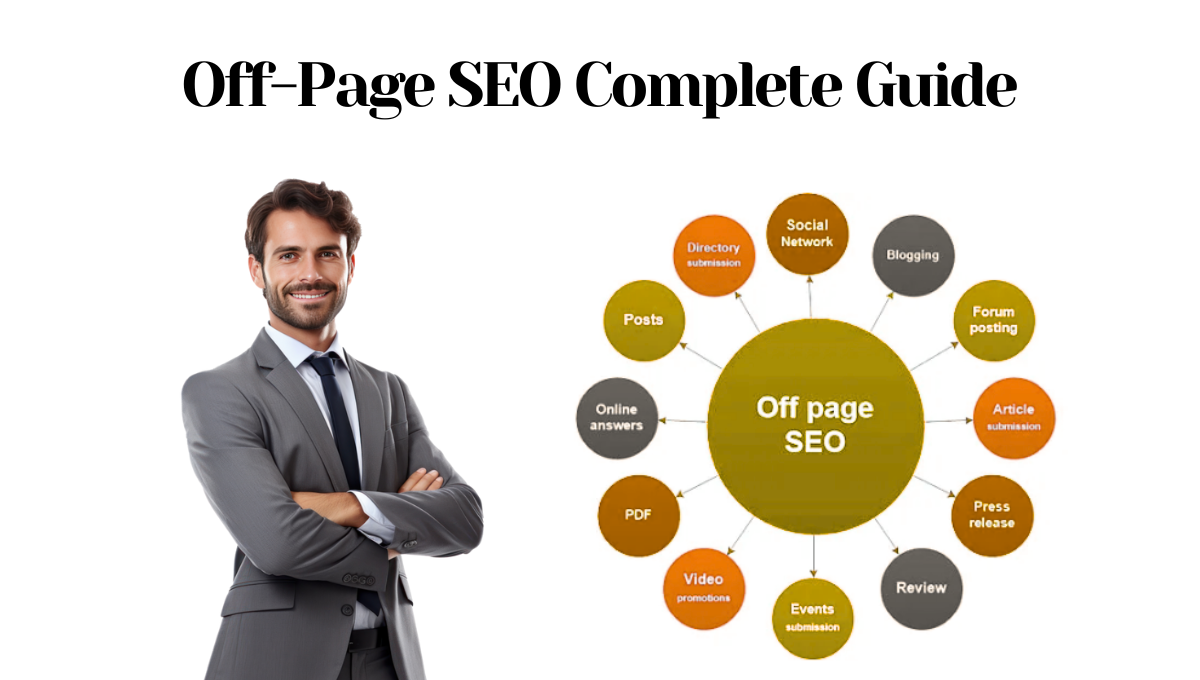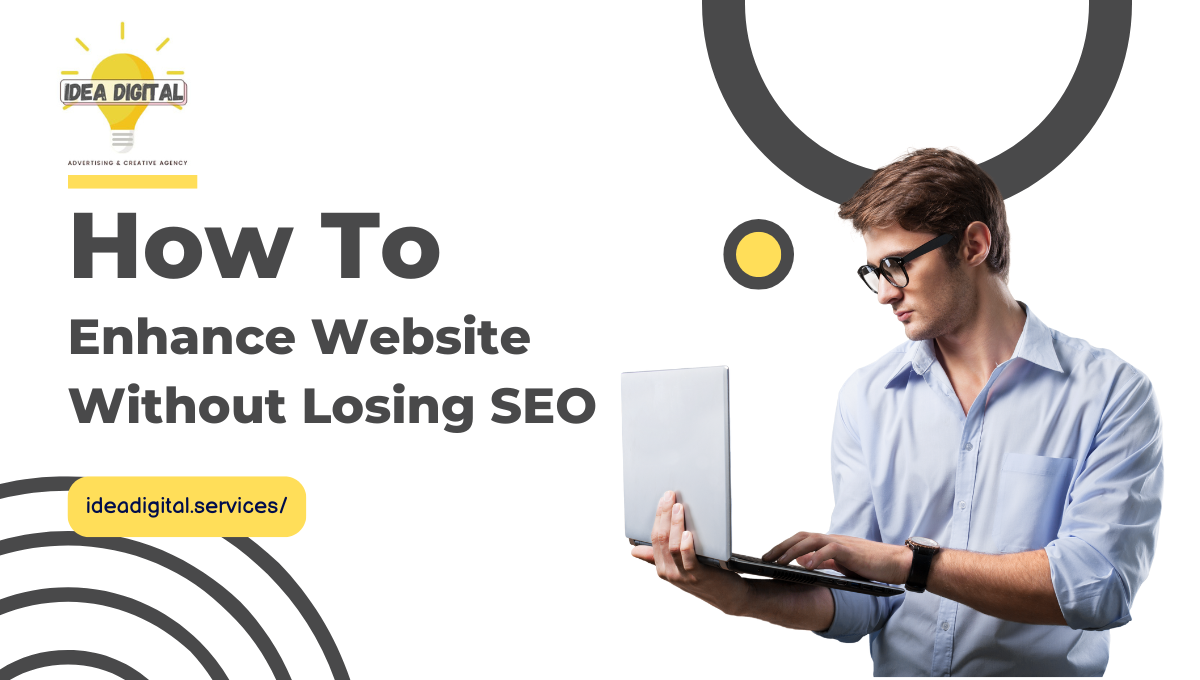What if I told you that your website isn’t always the most important thing for getting a better ranking on Google? It’s more important than ever to build trust outside of your website in 2025. Off-page SEO is a game-changer for brands that want to be in charge of the search results.
Like off-page SEO, people talk about you when you’re not there. When you learn how to use off-page tactics well, you’re not just trying to get higher rankings. You’re also building trust, credibility, and long-lasting relationships with your audience and other important people in your field. In a world where trust leads to clicks and sales, spending money on off-page SEO can make the difference between being invisible and being the best in your field.
1. What Is Off-Page SEO and Why Does It Matter in 2025
What does it mean to “optimise off-page SEO”? It means anything that happens outside of your website that affects your search engine rankings. On-page SEO improves the HTML code and content on your site, while off-page SEO works to improve your site’s authority and credibility online.
It has social signals, mentions of brands, backlinks, and even content made by users. Google is putting more weight on off-page factors when deciding who has authority and credibility as search algorithms change. The answer to the question “Why is off-page SEO important?” is simple: it shows that you are trustworthy to other people on the internet.
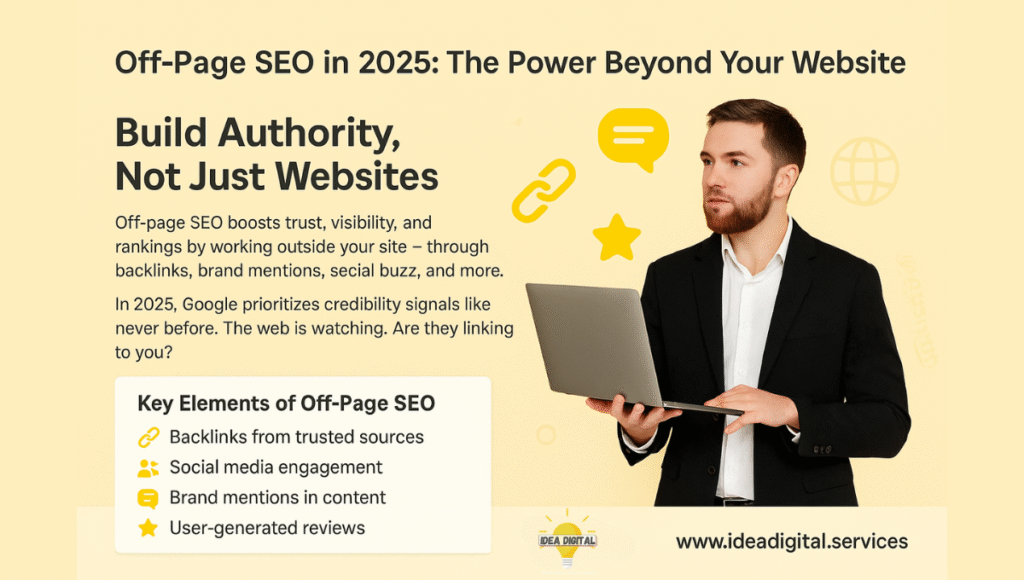
2. High‑Quality Backlink Building
Backlinks and online votes are similar. The more good votes your site gets, the higher it will rank. It’s not about how much you have, but how good it is. Getting links from high-authority websites that are relevant to your content is very important because it shows search engines that your content is useful and trustworthy. This is the basis for off-page SEO strategies that are focused on a specific audience.
Tip: You can start by working together, making resources that are worth linking to, or writing guest posts for blogs in your field.
3. Brand Mentions and Citation Signals
A mention of a brand that is helpful doesn’t always need a link that you can click on. Google can see brand mentions without links, which are also called “implied links,” and they can be rewarded. These are very important signs of authority and trustworthiness. When people write about your brand in news articles, blogs, or other publications, it tells search engines that your brand is important in your field and that people are talking about it, even if they don’t include a direct link to your website.
However, citation signals are very important for optimising local search engines. One of these things is making sure that your company’s name, address, and phone number (NAP) are the same in all directories, local listings, and business profiles. In this case, consistency is very important because search engines can get confused by inconsistent information, which can lower your local ranking power.
Why it matters: Mentions and citations of your brand make it easier for people to find it online. They make you look more trustworthy, give you more authority, and make it easier for people in your area to find and choose your business. These signals help your off-page SEO by making you more visible and trustworthy without relying only on traditional backlinks.
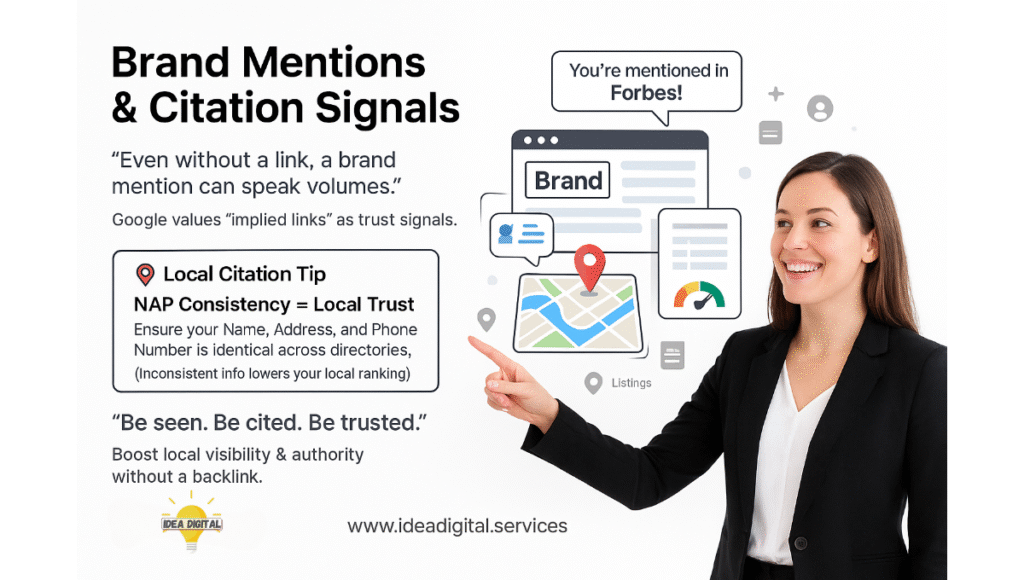
4. Leverage Social Media Engagement
Social media may not directly affect your rankings, but it is a great way to get more people to visit your website and get backlinks from other websites. More people will see your content if a lot of people share it. Some of those people might even think it’s useful enough to put links to it on their blogs or websites. This will help your off-page SEO profile.
A new study by the Content Marketing Institute (2024) says that 79% of marketers say that sharing on social media increases their link count, which in turn boosts their organic rankings. Sprout Social’s 2024 report also says that 68% of people are more likely to trust a brand that has good interactions on social media. This shows how important it is to use social media.
How to use WordPress for SEO without going to the site. First, make sure to share links to your blog posts on all of your social media sites often. Reply to your followers’ messages and comments to get them to share your content. This makes your brand more visible, builds trust, and gives search engines useful external signals that they like.
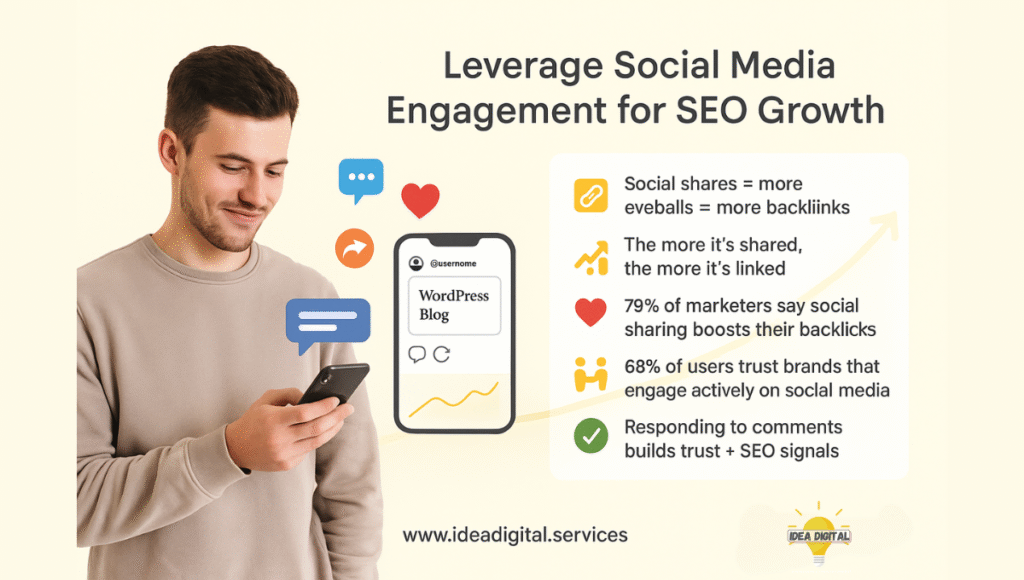
5. Influencer Collaboration & Guest Posting
Brand awareness can grow when you work with influencers. Influencers are great people to work with to get the word out about your brand and make connections because they have a lot of followers and are trusted.
Guest posting on well-known websites not only gives you backlinks, but it also makes you an expert in your field, which is an important part of off-page services.
Working with influencers and writing guest posts can help you reach new people who may not know about your brand. To be successful with off-page SEO in the long term, you need to get more followers on social media, get high-quality referral traffic, and make it more likely that people will mention and share your content naturally.
6. Online Communities & Forum Outreach
Joining online communities like Reddit, Quora, Facebook groups, or forums is one of the best ways to build your reputation, earn people’s trust, and get a lot of traffic to your niche-specific website. A lot of people go to these sites to find answers, solutions, and professional help. Because of this, they are the best place to show off what you know.
If you just leave links to your website, people may think you are a spammer and hurt your reputation. Instead, focus on giving people complete, helpful answers. Offer people good advice, talk about your own experiences, and give them new ways of looking at things. People are more likely to check out your profile, go to your website, or even talk about your brand somewhere else if they think you are an expert.
Once you become a respected voice in these communities, people often link to your insights in their blogs and other content. As a result, you get backlinks that are real. Because you keep working hard, you will eventually get a lot of organic mentions and high-quality referral traffic. This will make your brand more visible online and boost your off-page SEO as a whole.
7. Content Syndication & Digital PR
When you post your content on sites like Medium, LinkedIn Articles, or trade publications, more people will learn about your brand.
Thought leadership articles and press releases are two types of digital PR campaigns that can help you get good mentions in big publications. This plan will improve off-site SEO services and make your brand more trustworthy.
Digital PR and content syndication together can help you reach more people and build strong connections with journalists and business leaders. These connections could lead to chances to work together in the future, speak at events, and even more organic mentions. If you do all of these things, you will look more important and your off-page SEO will get better over time.
8. Podcasts & Multimedia Outreach
Podcasts are very popular right now, with more than 464 million people listening to them around the world (Statista, 2024). You can get backlinks and mentions from high-authority websites by being a guest on popular podcasts or starting your own.
Webinars and YouTube interviews are examples of multimedia content that can help you connect with others and get more attention. These off-page SEO services are current.
Giving useful information on podcasts or other multimedia platforms makes your brand more relatable and shows that you know what you’re talking about. This will make your audience more emotionally invested in you, which will make it more likely that they will trust and recommend you. Also, podcast show notes and video descriptions often include links to your website. This sends strong off-page SEO signals that bring in both qualified and authoritative traffic.
9. Local SEO & Citation Building (if location‑based)
Google says that 46% of all searches are for local information. You can’t afford to ignore local SEO if your business has a real location.
To get more people to find your business in local searches, you need to have your name, address, and phone number (NAP) listed on sites like Google My Business, Yelp, Bing Places, and industry-specific directories. Search engines can check the information about your business more easily if you use correct and consistent citations. This makes it easier for potential customers to find you and trust you.
If your NAP information isn’t always the same, it could confuse Google and your customers, which could hurt your reputation and lower your rankings. You can get more people to come to your store, build a strong local reputation, and stand out in very competitive local searches by keeping your listings up to date everywhere.
Tip for a full guide to off-page SEO: Check your citations often and update any old information to keep your online presence professional and trustworthy.
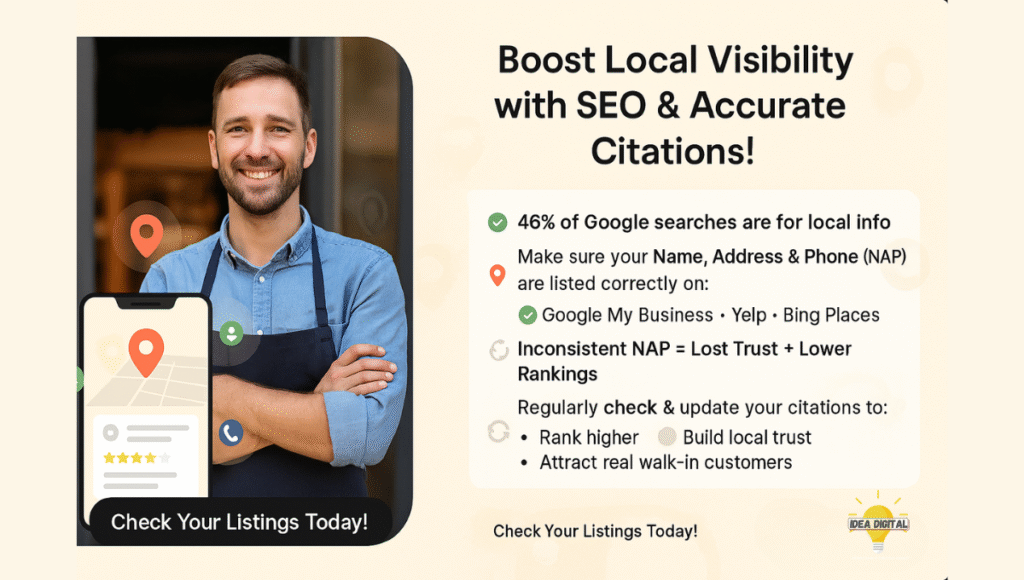
10. Reputation Management & E‑E‑A‑T Signals
The letters E-E-A-T stand for trust, experience, authority, and expertise. People will trust your brand if you protect your reputation by getting reviews, testimonials, and thought leadership.
What does off-page SEO mean in digital marketing? It’s not just about links; it’s about a lot of different signs of trustworthiness that affect how people and search engines see you.
Getting good reviews from happy customers and carefully responding to bad ones shows that you care about being honest and making the user experience better. These things improve your E-E-A-T signals and your reputation, which makes your brand more appealing to search engines and potential buyers.
11. Monitoring, Audits & Competitive Analysis
To keep your off-page SEO strategy strong, you need to regularly check your backlink profile and keep an eye on brand mentions. You can use tools like Ahrefs, SEMrush, and Moz to find spammy or harmful backlinks that could hurt your site’s reputation and rankings. You can protect your website from possible fines by getting rid of these bad links.
What are the steps I need to take to do off-page SEO? First, look at your current backlink profile and the number of times your brand has been mentioned. Next, make a plan that focuses on getting high-quality links and building authority through partnerships, social signals, and mentions of your brand. After that, keep making and getting these links while keeping an eye on how well you’re doing. Finally, to stay competitive and do well in the ever-changing world of SEO, you should change and improve your approach over time based on how well it works.
12. Common Off‑Page SEO Pitfalls to Avoid
If you don’t do off-page SEO correctly, it could hurt your site more than help it. For instance, buying low-quality backlinks might seem like a quick way to get higher in the rankings, but it can often get you in trouble with Google, which can make you much less visible. If you don’t pay attention to your brand’s reputation and don’t answer reviews, it can hurt trust, which is important for both users and search engines. Your link-building efforts might look like spam and fake if you only use automated outreach tools. This will make potential partners not want to work with you.
What is the best way to do SEO that doesn’t involve your website? Always make connections with people and build links in a way that is honest and based on values. This method not only keeps your site safe, but it also helps you build real, lasting trust and authority in your field.
Bonus: Advanced Off‑Page Techniques for 2025
Among the advanced strategies are:
- Influencer targeting, which uses AI to provide targeted outreach and connect you with the most relevant voices in your sector.
- Creating interactive events, like online get-togethers or live Q&A sessions, to promote community engagement and create long-lasting brand impressions.
- Discoverability will be improved by incorporating AI assistant mentions and voice search optimisation as more people rely on voice-activated devices.
- Making use of augmented reality (AR) and virtual reality (VR) experiences to produce viral content that builds backlinks and allows customers to engage with your products or services in a meaningful way.
- Leveraging machine learning to develop customised content journeys that offer different audience segments focused experiences while encouraging higher levels of engagement and shares.
- Working together with specialised online communities and micro-communities allows highly engaged audiences to promote your brand through grassroots advertising and in-person conversations.
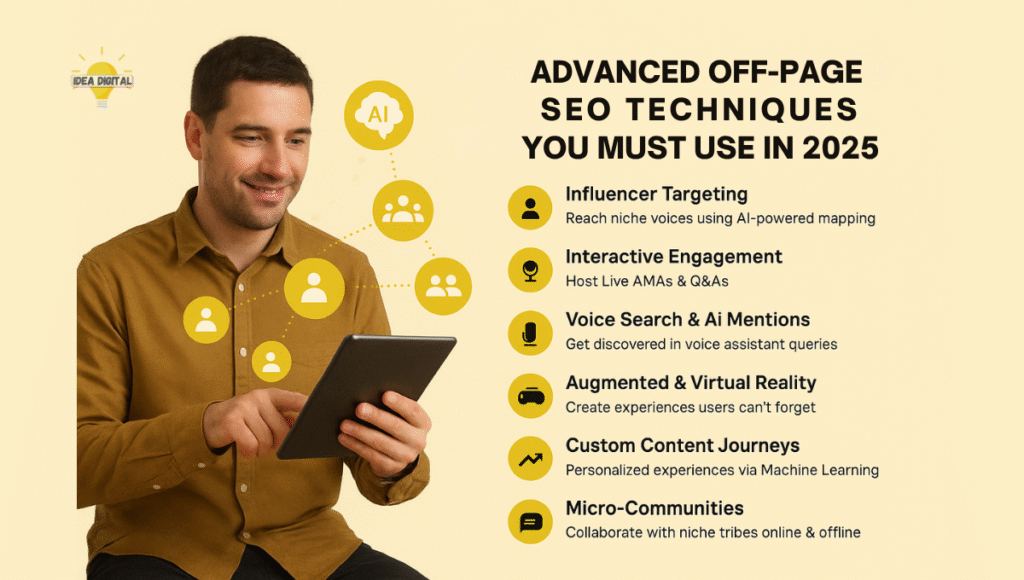
Conclusion: Building Your Off‑Page SEO Roadmap
Off-page SEO isn’t just something that’s nice to have; it’s something you need to do to improve your rankings and build your authority over time. This guide tells you everything you need to know about off-page SEO optimisation, including what it is and how it works, so you can do it with confidence.
Whether you’re doing off-page SEO yourself or hiring someone else to do it, focus on strategies that create real authority.
Regular off-page SEO investment not only improves your rankings, but it also helps you create a strong, long-lasting brand that stands out in your field. You can improve your partnerships, get more qualified traffic to your website, and protect your online presence for the future by using these strategies. Keep in mind that off-page SEO is a long-term project, not a short-term one, and that the best results come from consistent work.
Do you want to beat your competitors and become the best in your field? Start using these off-page SEO tips right away or hire a professional off-site SEO service to help you get ahead faster. Let’s get you to the top of Google.
FAQ’s
What does “off-page SEO” mean?
Off-page SEO is everything you do outside of your website to improve its search engine ranking. Building backlinks, getting mentions of your brand, getting signals from social media, and managing your reputation are all things you can do to make your site more trustworthy and authoritative.
What is off-page SEO?
Off-page SEO gets signals of trustworthiness and authority from other reliable websites on the web. When search engines see that other trusted sites are linking to or talking about your content, they think your site is more valuable and give it a higher rank.
How do I begin doing off-page SEO for my website?
First, check out your current backlinks. Then, make a plan to get good links by writing guest posts, working with influencers, sharing your content, and joining online groups. Instead of just looking for links, always try to give real value.
What’s the best way to do SEO off-page?
The best way to get links is to do it in a way that is honest and true to your values. This means writing good content that naturally gets links, making real connections, and doing strategic outreach, all while staying away from spammy or paid link schemes that could hurt your rankings.

